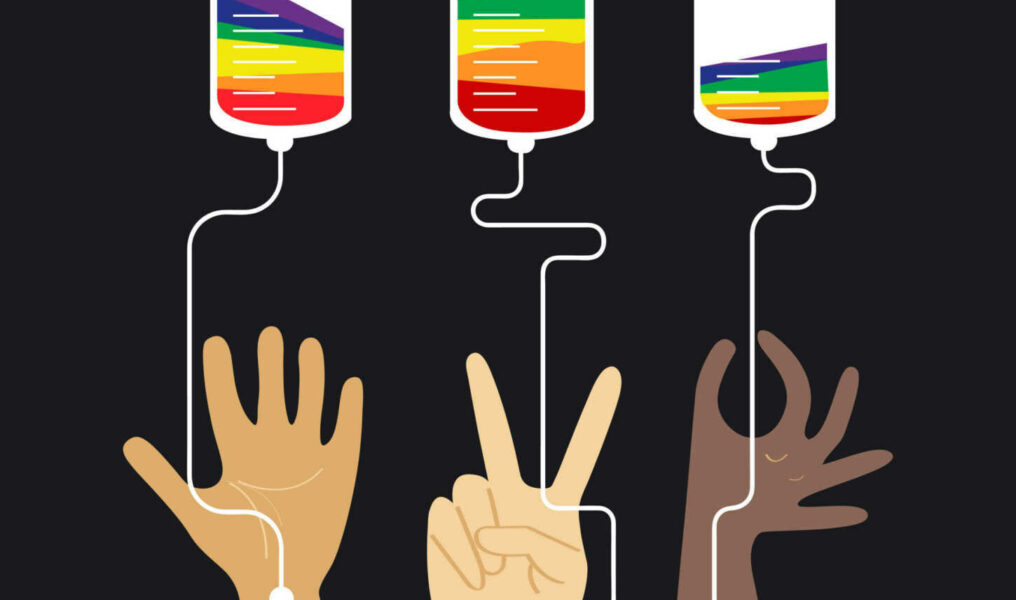Upcoming FDA Guidance May Finally Ease Restrictions on Blood Donation By Gay, Bisexual Men
Local healthcare professionals weigh in on ever-evolving policy

The FDA could reverse restrictive rules that have prevented many gay and bisexual men from donating blood. Since 2015, the agency has allowed members of the MSM (men who have sex with men) community to donate after three months of sexual abstinence, a less strict policy than the one put in place at the height of the HIV/AIDS epidemic in the mid-1980s.
The '80s policy banned people who had been sexually active with another man since 1977, when HIV is thought to have reached the U.S. That initial policy stated that such men were banned from donating blood for life.
In 2015, the FDA relaxed that policy to state that MSMs could donate blood so long as they had not been sexually active for one year prior. That period was ultimately reduced to three months amid a severe blood shortage in 2020. The same policy waiting period is applicable to women who have sex with gay or bi men, injection drug users, sex workers and people who’ve recently received tattoos or piercings or traveled to certain countries.
But now, the FDA has decided it’s time to review its policy toward MSMs again.
"The FDA remains committed to gathering the scientific data related to alternative donor deferral policies that maintain a high level of blood safety," read in part a statement released by the agency late last year. The FDA added that it plans to issue "updated draft guidance in the coming months."
That new guidance, say local leaders, cannot come soon enough.
“The restriction against MSM donating blood is obsolete and needs to be revisited,” said Dr. Paul Benson, who sees many MSMs at his Be Well Clinic in Berkley. “With the blood supply always being in limited supply, we can do better in determining risk of communicable diseases, including HIV in donors.”
Benson pointed out that not all gay men are at risk for HIV.
“Some take PrEP, some are not sexually active, and some are in monogamous HIV-negative relationships,” he said. “This puts these groups of individuals at no risk or less risk than others.”
What’s more, Benson said that the restriction adds to the stigma that may be present toward the queer community. Then there’s the fact testing methods have improved drastically since the FDA’s previous guidance was put in place.
“We can identify HIV much earlier in those asymptomatic for HIV,” he said. “All donated blood should be screened for communicable diseases such as Hepatitis and HIV regardless of who the donor is. It’s wrong to assume that if you are not MSM, you are safe to donate.”
Jeremy Toney has worked in the medical and HIV fields for two decades. Currently he is the PrEP navigation specialist with MAC Community Health. Toney said the existing FDA policy is unfair.
“I always thought that it was weird that gay men couldn’t donate due to HIV,” he said, echoing Dr. Benson. “They test all of the blood. So why wouldn’t they still be able to donate? They test all the blood anyway. I feel it was pretty discriminatory for that even to be a rule.”
Toney went on to say that loosening the policy or even getting rid of it altogether would be a “great thing.” If that were to happen, the FDA would likely simply use a questionnaire to determine each individual’s risk factors — something Benson said all who donate blood should already be completing.
“Anyone donating blood should have a sexual history taken, regardless of their sexuality,” said Benson. “If there is no increased risk in the sexual history for HIV, including IV drug use, then donation should proceed.”
And it’s not just that testing has improved, said Toney. But, also, the face of HIV and AIDS has changed dramatically since the guidelines were first put into place.
“The outdated rule makes it seem that HIV is a gay man only disease,” he said. “The numbers have shown that Black women were at one time the fastest growing number of new infections at one point. And heterosexual numbers are also up among the newly diagnosed.
“It’s pretty much an all-persons’ disease at this point,” he continued. “That’s why I think it’s just straight discriminatory against gay men.”
Another factor, of course, is the increased need for blood.
“We need more blood,” said Toney. “When I was at Henry Ford and they were doing blood drives, the numbers were always low. That was always a thought in my mind. If MSMs could donate blood they’d probably have more participation. … It’s crazy that a person who has HIV can donate an organ but not blood.”
Restricting blood donating exclusively to MSMs “makes little sense and imposes limits on the amount of blood collected,” Benson said. “The benefits of increasing the size of the donation pool safely with a risk assessment and infectious disease testing outweigh the risks of potentially acquiring HIV from a blood transfusion.”
Even some who are HIV positive should likely be able to donate, Benson said, referring to those living with an undetectable viral load.
“I’m not certain what the recommendations would be for those living with HIV but are on medications and are living with an undetectable viral load,” he said. “We know that a person living with HIV that is undetected cannot spread HIV to their partners. That does not include living undetected with HIV and donating blood. We need clinical trials to determine that.”
In the meantime, the potential policy reversal is gaining support across the country.
"While today's reports of an overdue move from the FDA is an important step, our community and leading medical experts will not stop advocating for the FDA to lift all restrictions against qualified LGBTQ blood donor candidates," said GLAAD President and CEO Sarah Kate Ellis in a statement.
The FDA is expected to release more information about potential updates to its blood donation guidelines in the next few weeks.










